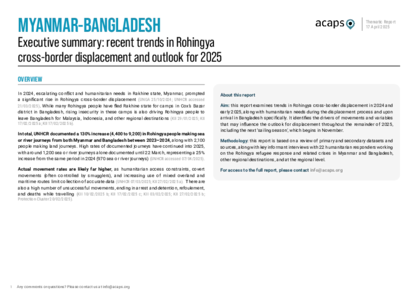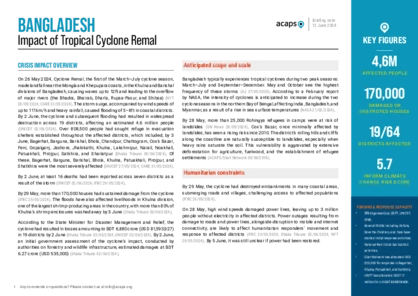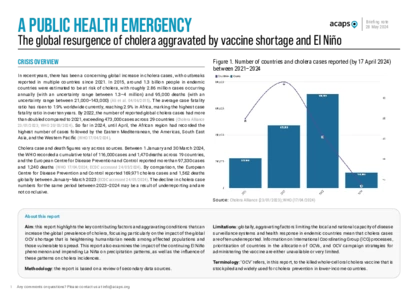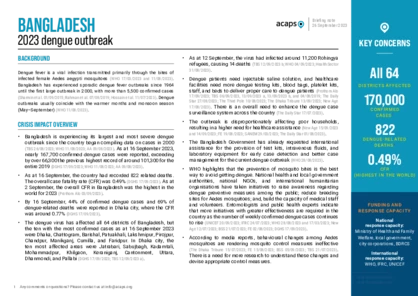Latest updates on country situation
24 March 2025
Widening funding gaps across the response have affected the humanitarian situation for Rohingya refugees in Bangladesh. By March 2025, the one million refugees in Cox’s Bazar camps were relying almost entirely on humanitarian aid for food, shelter, healthcare, and protection. The recent 90-day suspension of US funding and subsequent cuts in programmes have further strained an already underfunded response, reducing services and cutting food assistance, among other consequences. Health services are under severe strain; five hospitals that relied on US funds have closed, reducing healthcare access. Waste management services have also declined, leading to solid waste buildup and a heightened risk of diseases. At the same time, the suspension has compounded existing funding shortages for WFP, which has announced a reduction in food rations starting April, increasing the risk of malnutrition for the population. In 2025, 1.44 million Rohingya refugees and host community members will need food assistance. (WFP 24/03/2025, The Guardian 06/03/2025, The Daily Star 05/02/2025)
31 December 2024
On 24 December 2024, a fire in one of the Rohingya refugee camps in Ukhia, Cox’s Bazar, burnt down around 670 shelters, with around an additional 115 destroyed to prevent the spread of the fire. The fire also damaged or destroyed more than 170 other structures, including WASH facilities, mosques, learning centres, and NGO offices. It killed two refugees and rendered around 4,000 homeless. The people affected urgently need shelter, food, WASH, and medical assistance. (UNICEF 25/12/2024, RK 29/12/2024, VOA 25/12/2024)
19 November 2024
Around 23.6 million of the people living in Bangladesh, including around 300,000 Rohingya refugees, are estimated to experience high acute food insecurity levels – i.e. Crisis (IPC Phase 3) or worse – between October–December 2024. They are in urgent need of food assistance. The figure is a 45% increase from the previous projection of 16.5 million for April–October. More than 1.6 million people are projected to experience Emergency (IPC Phase 4) levels, mostly those residing in the districts of Sunamganj (around 274,000), Kurigram (around 238,000), and Noakhali (around 186,000). The main drivers of food insecurity are natural hazards such as Cyclone Remal and floods, the political unrest resulting from the widespread protests of mid-2024, and economic shocks, such as persistently high inflation, reduced remittance inflow, and currency depreciation. (IPC 07/11/2024, IPC 02/04/2024)
29 October 2024
Since the beginning of 2024, around 40,000 Rohingya have crossed into Bangladesh, fleeing the escalating violence in Myanmar's Rakhine state resulting from the conflict between the military junta and the Arakan Army and the subsequent worsening of the humanitarian crisis in the state. They are residing in overcrowded refugee camps in Cox’s Bazar, which comprise more than one million registered Rohingya refugees, almost all of whom depend humanitarian aid. The newly arrived Rohingya refugees urgently need food, potable water, and access to other essential services. (Stimson Center 25/10/2024, RFA 28/10/2024)
17 September 2024
Floods since late August 2024 have damaged around 307,000 houses and destroyed 27,000 in 11 districts of eastern Bangladesh. The floods have damaged over 350,000 hectares of crops, threatening livelihood food security in the coming months in the flood-affected areas. The flooding has also damaged vast agricultural lands in the districts of Chattogram, Feni, Noakhali, and Sylhet, where around 3.2 million people face high levels of acute food insecurity – i.e. Crisis (IPC Phase 3) conditions. Continuous rain in mid-September also caused floods, worsening the situation in some parts and newly inundating other parts of the country. Urgent needs include food, potable water, access to WASH facilities, hygiene kits, healthcare services, and shelter support. (Shelter Cluster 11/09/2024, IPC 02/04/2024, Oxfam 25/08/2024)
04 September 2024
In July–August 2024, around 8,000 Rohingya crossed into Bangladesh, fleeing the escalating violence in Myanmar's Rakhine state resulting from the conflict between the Myanmar military junta and the Arakan Army. They are residing in overcrowded shelters in Cox’s Bazar refugee camps, adding to the around 954,000 Rohingya refugees already settled there. The newly arrived Rohingya refugees urgently need food, potable water, and access to other essential services. (Reuters 04/09/2024, Govt. Bangladesh/UNHCR 31/07/2024)
03 September 2024
There has been an outbreak of waterborne diseases, such as diarrhoea, dysentery, and skin infections, in areas of Bangladesh affected by the floods that occurred in late August 2024, especially in the districts of Feni and Noakhali. This outbreak is overwhelming health facilities in the area. The floods have damaged around 163,000 water points and 296,000 latrines, making adequate WASH access very challenging for the affected people and likely further increasing the spread of waterborne diseases. The affected people urgently need food, potable water, healthcare support, access to WASH facilities, and shelter. (DT 31/08/2024, The Daily Star 01/09/2024, CARE 31/08/2024)
current crises
in
Bangladesh
These crises have been identified through the INFORM Severity Index, a tool for measuring and comparing the severity of humanitarian crises globally.
BGD012 - Food Security Crisis
Last updated 24/03/2025
Drivers
Food Security
Crisis level
Country
Severity level
3.2 High
Access constraints
2.0
BGD001 - Country Level
Last updated 24/03/2025
Drivers
Conflict
Violence
Displacement
Floods
Crisis level
Country
Severity level
3.5 High
Access constraints
3.0
BGD002 - Rohingya Refugees
Last updated 24/03/2025
Drivers
Conflict
Violence
Displacement
Crisis level
Country
Severity level
3 Medium
Access constraints
3.0
Analysis products
on
Bangladesh
17 April 2025
Myanmar-Bangladesh: trends in Rohingya cross-border displacement and outlook for 2025
DOCUMENT / PDF / 150 KB
This report examines trends in Rohingya cross-border displacement in 2024 and early 2025, along with humanitarian needs during the displacement process and upon arrival in Bangladesh specifically. It identifies the drivers of movements and variables that may influence the outlook for displacement in 2025.
04 September 2024
Bangladesh: flooding
DOCUMENT / PDF / 487 KB
On 20 August 2024, heavy monsoon rains, alongside a low-pressure area over the Bay of Bengal, caused widespread flooding in eastern Bangladesh, increasing the water levels in Dhalai, Feni, Gomti, Halda, Khoai, Manu, Muhuri, and Surma-Kushiara Rivers.
12 June 2024
Bangladesh: impact of tropical cyclone remal
DOCUMENT / PDF / 381 KB
On 26 May 2024, Cyclone Remal, the first of the March-July cyclone season, made landfall near the Mongla and Khepupara coasts, in the Khulna and Barishal divisions of Bangladesh. By 2 June, the cyclone and subsequent flooding had resulted in widespread destruction across 19 districts, affecting an estimated 4.6 million people.
28 May 2024
Global increase of cholera: aggravated by vaccine shortage and El Niño
DOCUMENT / PDF / 341 KB
This report highlights the key contributing factors and aggravating conditions that can increase the global prevalence of cholera, focusing particularly on the impact of the global OCV shortage that is heightening humanitarian needs among affected populations and those vulnerable to spread.
Attached resources
26 September 2023
Bangladesh: 2023 dengue outbreak
DOCUMENT / PDF / 1 MB
Bangladesh is experiencing its largest and most severe dengue outbreak since the country began compiling data on cases in 2000. As at 16 September 2023, nearly 167,700 confirmed dengue cases were reported, exceeding by over 66,300 the previous highest record of around 101,300 for the entire 2019.







